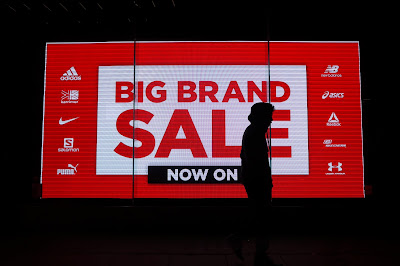Event marketers face a dilemma in their profession: should you prioritize sales or brand building? Does sales drive your brand or does brand drive your sales?
It's a question that many of you think about, as you
strive to make the most of your resources and efforts. While the answer may not
be one-size-fits-all, understanding the dynamics between sales and brand
building is essential for crafting a successful event marketing strategy. In this
article, I’ll explore the interplay between these two objectives and determine
which should take precedence for better long-term results.
The Power of Event Marketing
Event marketing is a dynamic field, with professionals
tasked with creating and promoting events that capture attention, drive
engagement, and achieve a range of objectives. From product launches and trade
shows to conferences and experiential activations, the possibilities are vast.
Event marketers are responsible for ensuring that events resonate with their
target audience and achieve a positive return on investment. In this context,
the debate between sales and brand building takes center stage.
Sales-Driven Strategies
A sales-focused approach in event marketing prioritizes
immediate revenue generation. Event marketers who lean heavily in this
direction are primarily concerned with ticket sales, merchandise purchases, or
direct conversions at the event itself. The appeal of this approach is that it
can provide an immediate return on investment and potentially recoup event
costs. However, it may neglect the long-term potential of brand building.
The power of a sales-driven event marketing strategy lies in
its ability to generate revenue that can be reinvested in future events. For
businesses with limited resources, this can be a lifeline. It also allows for
quantifiable results, making it easier to measure the success of an event based
on sales figures.
Brand-Driven Strategies
On the other hand, a brand-building approach seeks to create
a lasting impact that extends beyond the immediate event. In this strategy,
event marketers focus on creating memorable experiences that enhance the
brand's reputation, equity, and recognition. This can involve storytelling,
experiential elements, and audience engagement activities that resonate with
the attendees and leave a lasting impression.
Brand-driven strategies often take a longer time to yield
tangible returns, but the potential benefits are significant. A strong event
brand can attract loyal customers, partners, and sponsors over the long term.
It can also differentiate the event in a crowded marketplace, enabling it to
command higher ticket prices and sponsorship deals.
The Synergy Between Sales and Brand Building
The debate between sales and brand building can be
misleading because they are not mutually exclusive. In fact, they can
complement each other in a powerful way. Effective event marketing strategies
often strike a balance between generating sales and building a strong brand.
Here's how:
Brand Value Drives Sales: A well-established event brand can
make selling tickets and merchandise easier. People are more likely to attend
an event or make a purchase if they have a positive perception of the brand.
Therefore, brand building indirectly contributes to sales.
Sales Fund Brand-Building Initiatives: The revenue generated
from sales can be reinvested in brand-building efforts. This can include
content creation, social media marketing, and enhancing the event's overall
experience.
Audience Engagement: Engaging attendees through unique and
memorable experiences at an event not only enhances the brand but can also lead
to higher sales as satisfied customers are more likely to make repeat purchases
or refer others.
Sponsorship Opportunities: Strong event brands attract
sponsors willing to invest in the event. These partnerships can bring in
additional revenue, enabling both sales and brand building.
In the world of event marketing, the question of whether to
prioritize sales or brand building is a complex one. Ultimately, the most
successful event marketing strategies find a balance that leverages the power
of both. Sales can provide immediate financial gains and facilitate brand
growth, while brand building contributes to long-term sustainability and
enhanced sales potential.
As an event marketer, it's essential to evaluate your
specific goals, resources, and constraints when determining the right mix of
sales and brand-building efforts. The answer may vary from event to event, but
it's clear that a harmonious integration of both aspects is the key to
achieving better results in the long run. Strive to create memorable
experiences that resonate with your audience, build a strong event brand, and
watch as sales naturally follow.
Stay tuned for more insights and tips on event marketing success.


Comments
Post a Comment